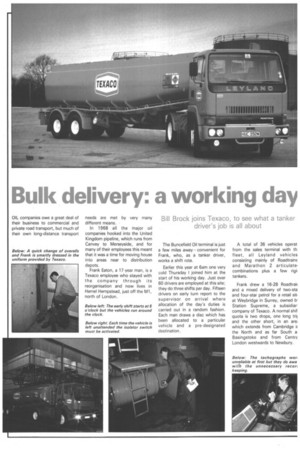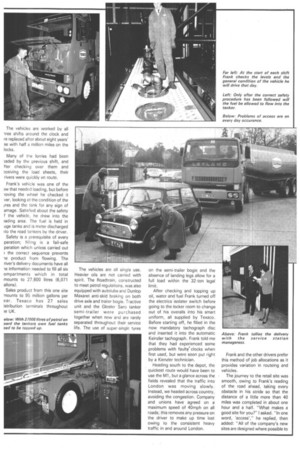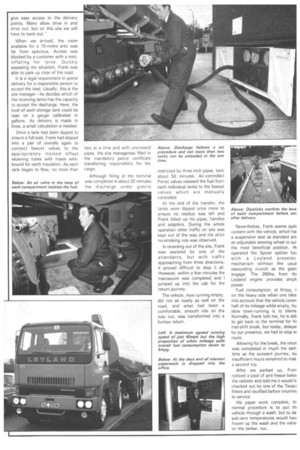Bulk delivery: a working day
Page 44

Page 45

Page 46

If you've noticed an error in this article please click here to report it so we can fix it.
Bill Brock joins Texaco, to see what a tanker driver's job is all about
OIL companies owe a great deal of their business to commercial and private road transport, but much of their own long-distance transport needs are met by very many different means.
In 1968 all the major oil companies hooked into the United Kingdom pipeline, which runs from Canvey to Merseyside, and for many of their employees this meant that it was a time for moving house into areas near to distribution depots.
Frank Eaton, a 17-year man, is a Texaco employee who stayed with the company through its reorganisation and now lives in Hemel Hempstead, just off the Ml, north of London, The Buncefield Oil terminal is just a few miles away —convenient for Frank, who, as a tanker driver, works a shift rota.
Earlier this year at 6am one very cold Thursday I joined him at the start of his working day. Just over 60 drivers are employed at this site; they do three shifts per day. Fifteen drivers on early turn report to the supervisor on arrival where allocation of the day's duties is carried out in a random fashion. Each man draws a disc which has been allocated to a particular vehicle and a pre-designated destination. A total of 36 vehicles operat from the sales terminal with th fleet, all Leyland vehicles consisting mainly of Roadtrains and Marathon 2 articulate' combinations plus a few rigi. tankers.
Frank drew a 16-28 Roadtraii and a mixed delivery of two-sta and four-star petrol for a retail sit' at Weybridge in Surrey, owned b, Station Supreme, a subsidiar. company of Texaco. A normal shif quota is two drops, one long trip and the other short, in an are which extends from Cambridge ii the North and as far South a: Basingstoke and from Centre London westwards to Newbury. The vehicles are worked by all -wee shifts around the clock and re replaced after about eight years' se with half a million miles on the locks.
Many of the lorries had been 3aded by the previous shift, and fter checking over them and eceiving the load sheets, their rivers were quickly en route.
Frank's vehicle was one of the ?,w that needed loading, but before loving the wheel he checked it ver, looking at the condition of the (res and the tank for any sign of amage. Satisfied about the safety f the vehicle, he drew into the )ading area. The fuel is held in uge tanks and is meter discharged Ito the road tankers by the driver. Safety is a prerequisite of every peration; filling is a fail-safe peration which unless carried out the correct sequence prevents le product from flowing. The river's delivery documents have all le information needed to fill all six ompartments which in total mounts to 27,600 litres (6,071 allons).
Sales product from this one site mounts to 95 million gallons per ear. Texaco has 27 sales istribution terminals throughout Ie UK. The vehicles are all single use. Heavier oils are not carried with spirit. The Roadt rain, constructed to meet petrol regulations, was also equipped with autolube and Dunlop Maxaret anti-skid braking on both drive axle and trailer bogie. Tractive unit and the Gloster Saro tanker semi-trailer were purchased together when new and are rarely separated throughout their service life. The use of super-single tyres on the semi-trailer bogie and the absence of landing legs allow for a full load within the 32-ton legal limit.
After checking and topping up oil, water and fuel Frank turned off the electrics isolater switch before going to the locker room to change out of his overalls into his smart uniform, all supplied by Texaco. Before starting off, he filled in the now mandatory tachograph disc and inserted it into the automatic Keinzler tachograph. Frank told me that they had experienced some problems with faulty' clocks when first used, but were soon put right by a Kienzler technician.
Heading south to the depot, the quickest route would have been to use the Ml, but a glance across the fields revealed that the traffic into London was moving slowly. Instead, we headed across country, avoiding the congestion. Company and unions have agreed on a maximum speed of 40mph on all roads; this removes any pressure on the driver to make up time lost owing to the consistent heavy traffic in and around London. Frank and the other drivers prefer this method of job allocations as it provides variation in routeing and vehicles.
The journey to the retail site was smooth, owing to Frank's reading of the road ahead, taking every obstacle in his stride so that the distance of a little more than 40 miles was completed in about one hour and a half. "What makes a good site for you?" I asked. "In one word, 'access'," he replied, then added: "All of the company's new sites are designed where possible to give easy access to the delivery points. Many allow drive in and drive out, but on this site we will have to back out."
When we arrived, the room available for a 15-metre artic was far from spacious. Access was blocked by a customer with a mini, inflating her tyres. Quickly assessing the situation, Frank was able to park up clear of the road.
It is a legal requirement in petrol delivery for a responsible person to accept the load. Usually, this is the site manager — he decides which of the receiving tanks has the capacity to accept the discharge. Here, the level of each storage tank could be read on a gauge calibrated in gallons. As delivery is made in litres, a small calculation is needed.
Once a tank had been dipped to ensure a full load, Frank had slipped into a pair of overalls again to connect fawcet valves to the appropriately marked offset receiving tubes with hoses wirebound for earth insulation. As each tank began to flow, no more than two at a time and with uncrossed pipes, the site manageress filled in the mandatory petrol certificate transferring responsiblity for the cargo.
Although filling at the terminal was completed in about 20 minutes the discharge under gravity restricted by three-inch pipes, took about 50 minutes. Air-controlled Perret valves released the fuel from each individual tanks to the fawcet valves which are manually controlled.
At the end of the transfer, the tanks were dipped once more to ensure no residue was left and Frank tidied up his pipes, handles and adapters. During the whole operation other traffic on site was kept out of the way and the strict no-smoking rule was observed.
In reversing out of the site, Frank was assisted by one of the attendants, but with traffic approaching from three directions, it .proved difficult to stop it all. However, within a few minutes the manoeuvre was completed and I jumped up into the cab for the return journey.
The vehicle, now running empty, did not sit nearly. as well on the road, and what had been a comfortable, smooth ride on the way out, was transformed into a bumpy return. Nevertheless, Frank seems quit( content with the vehicle, which ha! a suspension seat as standard an an adjustable steering wheel to sui the most beneficial position. I-I( operated the Spicer splitter bo; with a Leyland preselec mechanism without the usua resounding crunch as the gear! engage. The 260hp from thr Leyland engine provides amok power.
Fuel consumption, at 6mpg, on the heavy side when one take' into account that the vehicle coven half of its mileage while empty, bu slow town-running is to blame Normally, Frank told me, he is ablr to get back to the terminal for hi mid-shift break, but today, delayer by our presence, we had to stop er route.
Allowing for the break, the retur was completed in much the sam time as the outward journey, bu insufficient hours remained to mak a second trip.
After we parked up, FranI noticed a pool of anti-freeze belay the radiator and told me it would b checked out by one of the Texacr fitters and rectified before returninr to service.
His paper work complete, hi normal procedure is to put thi vehicle through a wash, but to da sub-zero temperatures would hay, frozen up the wash and the valve on the tanker, too.


































































